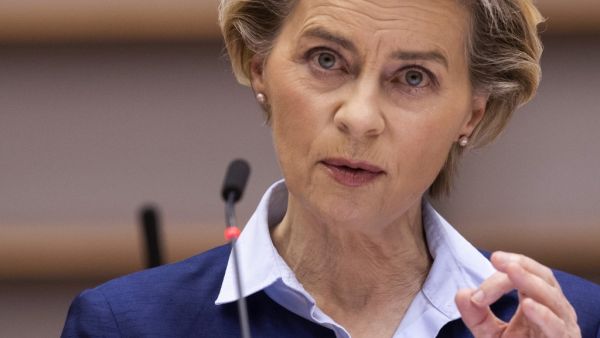Ursula von der Leyen today warned the path to a post-Brexit trade deal with the UK is 'very narrow' as she suggested the crunch issue of fishing rights may never be resolved.
The President of the European Commission told MEPs in Brussels this morning that the next few days in the talks will be 'decisive'.
But she said 'as things stand I cannot tell you whether there will be a deal or not'.
Brexit: Ursula von der Leyen says 'path to agreement' between UK and EU now exists - live https://t.co/iSQTUGX3CC
— The Guardian (@guardian) December 16, 2020
Ms von der Leyen said she believed there is a 'path to an agreement now' but it is still unclear whether negotiations will succeed.
On the issue of fishing rights, she said discussions remain 'very difficult' as she acknowledged the two sides may fail to agree to a compromise.
She said: 'We do not question the UK's sovereignty on its own waters. But we ask for predictability and stability for our fishermen and our fisherwomen.
'And, in all honesty, it sometimes feels that we will not be able to resolve this question.
'But we must continue to try to find a solution and it is the only responsible and right course of action.'
She added: 'The clock puts us all in a very difficult situation, not least this Parliament and its right to exercise democratic scrutiny and ratification.'
For months, the post-Brexit negotiations have been stuck on the issues of fishing rights and the 'level playing field' measures to prevent unfair competition.
Ms von der Leyen told MEPs there has been progress on the second of those issues.
'On the level playing field, our aim is simply to ensure fair competition on our own market, very simple,' she said.
'And this is why we need to establish robust mechanisms. The architecture we're working on rests on two pillars: state aid and standards.
Fish could still sink Brexit deal, says EU's Ursula von der Leyen https://t.co/7eVB6bynIl
— Guardian news (@guardiannews) December 16, 2020
On state aid, we have made progress based on common principles, guarantees of domestic enforcement and the possibility to autonomously remedy the situation when needed.
'On standards, we have agreed a strong mechanism of non-regression. That's a big step forward.'
However, Ms von der Leyen said there are still difficulties on how to 'future proof' fair competition, with the UK having strongly resisted attempts to force it to follow EU rules.
This article has been adapted from its original source.








